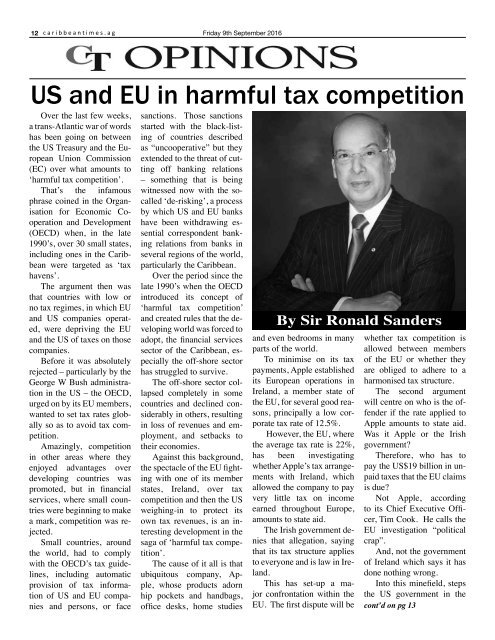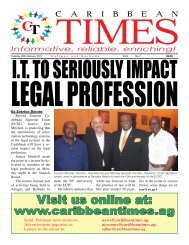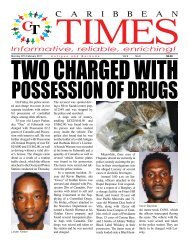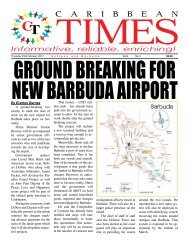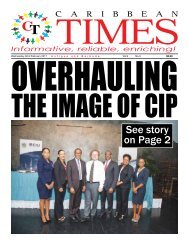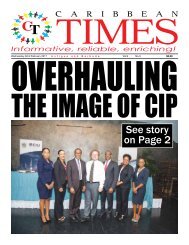Caribbean Times 89th Issue - Friday 9th September 2016
Caribbean Times 89th Issue - Friday 9th September 2016
Caribbean Times 89th Issue - Friday 9th September 2016
You also want an ePaper? Increase the reach of your titles
YUMPU automatically turns print PDFs into web optimized ePapers that Google loves.
12 c a r i b b e a n t i m e s . a g<br />
<strong>Friday</strong> <strong>9th</strong> <strong>September</strong> <strong>2016</strong><br />
US and EU in harmful tax competition<br />
Over the last few weeks,<br />
a trans-Atlantic war of words<br />
has been going on between<br />
the US Treasury and the European<br />
Union Commission<br />
(EC) over what amounts to<br />
‘harmful tax competition’.<br />
That’s the infamous<br />
phrase coined in the Organisation<br />
for Economic Cooperation<br />
and Development<br />
(OECD) when, in the late<br />
1990’s, over 30 small states,<br />
including ones in the <strong>Caribbean</strong><br />
were targeted as ‘tax<br />
havens’.<br />
The argument then was<br />
that countries with low or<br />
no tax regimes, in which EU<br />
and US companies operated,<br />
were depriving the EU<br />
and the US of taxes on those<br />
companies.<br />
Before it was absolutely<br />
rejected – particularly by the<br />
George W Bush administration<br />
in the US – the OECD,<br />
urged on by its EU members,<br />
wanted to set tax rates globally<br />
so as to avoid tax competition.<br />
Amazingly, competition<br />
in other areas where they<br />
enjoyed advantages over<br />
developing countries was<br />
promoted, but in financial<br />
services, where small countries<br />
were beginning to make<br />
a mark, competition was rejected.<br />
Small countries, around<br />
the world, had to comply<br />
with the OECD’s tax guidelines,<br />
including automatic<br />
provision of tax information<br />
of US and EU companies<br />
and persons, or face<br />
sanctions. Those sanctions<br />
started with the black-listing<br />
of countries described<br />
as “uncooperative” but they<br />
extended to the threat of cutting<br />
off banking relations<br />
– something that is being<br />
witnessed now with the socalled<br />
‘de-risking’, a process<br />
by which US and EU banks<br />
have been withdrawing essential<br />
correspondent banking<br />
relations from banks in<br />
several regions of the world,<br />
particularly the <strong>Caribbean</strong>.<br />
Over the period since the<br />
late 1990’s when the OECD<br />
introduced its concept of<br />
‘harmful tax competition’<br />
and created rules that the developing<br />
world was forced to<br />
adopt, the financial services<br />
sector of the <strong>Caribbean</strong>, especially<br />
the off-shore sector<br />
has struggled to survive.<br />
The off-shore sector collapsed<br />
completely in some<br />
countries and declined considerably<br />
in others, resulting<br />
in loss of revenues and employment,<br />
and setbacks to<br />
their economies.<br />
Against this background,<br />
the spectacle of the EU fighting<br />
with one of its member<br />
states, Ireland, over tax<br />
competition and then the US<br />
weighing-in to protect its<br />
own tax revenues, is an interesting<br />
development in the<br />
saga of ‘harmful tax competition’.<br />
The cause of it all is that<br />
ubiquitous company, Apple,<br />
whose products adorn<br />
hip pockets and handbags,<br />
office desks, home studies<br />
By Sir Ronald Sanders<br />
and even bedrooms in many<br />
parts of the world.<br />
To minimise on its tax<br />
payments, Apple established<br />
its European operations in<br />
Ireland, a member state of<br />
the EU, for several good reasons,<br />
principally a low corporate<br />
tax rate of 12.5%.<br />
However, the EU, where<br />
the average tax rate is 22%,<br />
has been investigating<br />
whether Apple’s tax arrangements<br />
with Ireland, which<br />
allowed the company to pay<br />
very little tax on income<br />
earned throughout Europe,<br />
amounts to state aid.<br />
The Irish government denies<br />
that allegation, saying<br />
that its tax structure applies<br />
to everyone and is law in Ireland.<br />
This has set-up a major<br />
confrontation within the<br />
EU. The first dispute will be<br />
whether tax competition is<br />
allowed between members<br />
of the EU or whether they<br />
are obliged to adhere to a<br />
harmonised tax structure.<br />
The second argument<br />
will centre on who is the offender<br />
if the rate applied to<br />
Apple amounts to state aid.<br />
Was it Apple or the Irish<br />
government?<br />
Therefore, who has to<br />
pay the US$19 billion in unpaid<br />
taxes that the EU claims<br />
is due?<br />
Not Apple, according<br />
to its Chief Executive Officer,<br />
Tim Cook. He calls the<br />
EU investigation “political<br />
crap”.<br />
And, not the government<br />
of Ireland which says it has<br />
done nothing wrong.<br />
Into this minefield, steps<br />
the US government in the<br />
cont’d on pg 13


